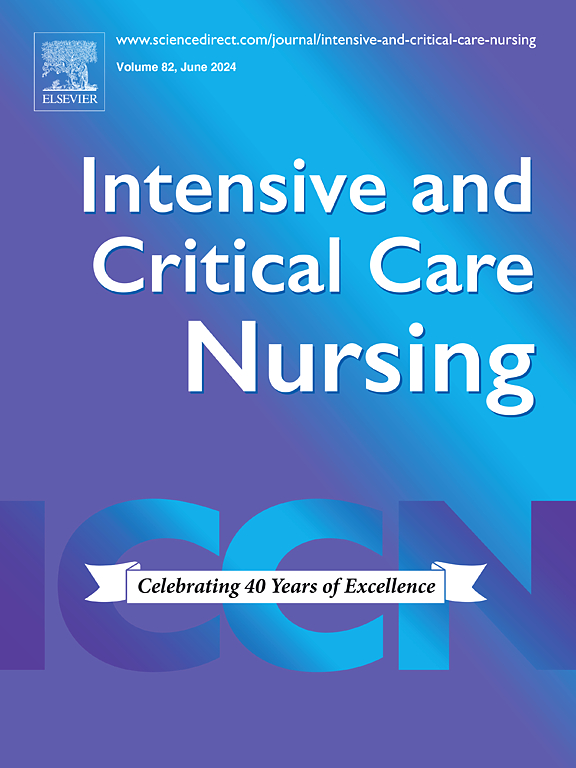Effects of omega-3 fatty acids on hyper-inflammatory response and clinical outcomes in critically ill patients: a meta-analysis
IF 4.7
2区 医学
Q1 NURSING
引用次数: 0
Abstract
Background
There are still debates regarding the impact of omega-3 fatty acids on immune response and clinical outcomes in critically ill patients.
Objective
Explore the effects of omega-3 fatty acids on hyper-inflammatory response and clinical outcomes in critically ill patients.
Methods
We searched five databases from inception to July 18, 2024 and collected randomized controlled trials in which critically ill patients treated in an intensive care unit (ICU) were administered omega-3 fatty acids as a supplement. Data were expressed as mean difference, standard mean difference, or odds ratio with 95% confidence interval (CI).
Results
There were 41 randomized controlled trials that met the inclusion criteria, and they involved 3152 patients. The intervention with omega-3 fatty acids significantly reduced the following biomarkers: white blood cell count on day 3 and day 6/7, tumor necrosis factor-α (TNF-α) on day 3 and day 5, interleukin-1 (IL-1), interleukin-6 (IL-6), and procalcitonin at the last observation post-intervention. The intervention also reduced the Sequential Organ Failure Assessment (SOFA) score on day 5 and lowered the risk of secondary infections and new sepsis/septic shock, both determined during follow-up. It also significantly shortened the ICU stay and reduced the 28-day mortality rate, although ICU mortality rate remained unchanged.
Conclusions
Omega-3 fatty acids supplementation may be effective in modulating hyper-inflammatory responses, reducing the risk of complications and disease severity, and improving clinical outcomes.
Implications for clinical practice
Omega-3 fatty acids may serve as a potential nutritional therapy for critically ill patients, when medical staff identify the hyperinflammatory status of patients based on medical history, clinical manifestations, and laboratory results.
omega-3脂肪酸对危重患者高炎症反应和临床结果的影响:荟萃分析
背景:关于ω -3脂肪酸对危重患者免疫反应和临床结果的影响仍存在争议。目的:探讨omega-3脂肪酸对危重患者高炎症反应及临床结局的影响。方法:我们检索了五个数据库,从建立到2024年7月18日,收集了在重症监护病房(ICU)治疗的危重患者给予omega-3脂肪酸作为补充的随机对照试验。数据以均数差、标准均数差或95%可信区间(CI)的比值比表示。结果:符合纳入标准的随机对照试验41项,共纳入3152例患者。omega-3脂肪酸干预显著降低了以下生物标志物:干预后第3天和第6/7天的白细胞计数,第3天和第5天的肿瘤坏死因子-α (TNF-α),干预后最后一次观察时的白细胞介素-1 (IL-1)、白细胞介素-6 (IL-6)和降钙素原。干预还降低了第5天的顺序器官衰竭评估(SOFA)评分,降低了继发感染和新脓毒症/感染性休克的风险,这两项都是在随访期间确定的。尽管ICU死亡率保持不变,但它也显著缩短了ICU住院时间,降低了28天死亡率。结论:补充Omega-3脂肪酸可能有效调节高炎症反应,降低并发症和疾病严重程度的风险,并改善临床结果。临床实践意义:当医务人员根据病史、临床表现和实验室结果确定患者的高炎症状态时,Omega-3脂肪酸可作为危重患者的潜在营养治疗方法。
本文章由计算机程序翻译,如有差异,请以英文原文为准。
求助全文
约1分钟内获得全文
求助全文
来源期刊

Intensive and Critical Care Nursing
NURSING-
CiteScore
6.30
自引率
15.10%
发文量
144
审稿时长
57 days
期刊介绍:
The aims of Intensive and Critical Care Nursing are to promote excellence of care of critically ill patients by specialist nurses and their professional colleagues; to provide an international and interdisciplinary forum for the publication, dissemination and exchange of research findings, experience and ideas; to develop and enhance the knowledge, skills, attitudes and creative thinking essential to good critical care nursing practice. The journal publishes reviews, updates and feature articles in addition to original papers and significant preliminary communications. Articles may deal with any part of practice including relevant clinical, research, educational, psychological and technological aspects.
 求助内容:
求助内容: 应助结果提醒方式:
应助结果提醒方式:


